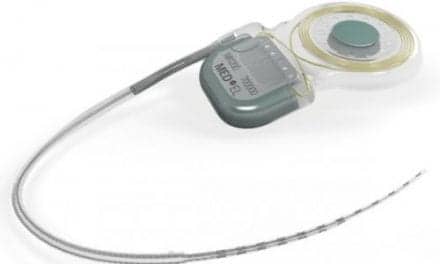After hearing aids improve their lives, a couple grieves for the time they lost to poor communication in their marriage.
By Michael A. Harvey, PhD
I am a psychologist who specializes in treating people with hearing loss. Wilma’s first words as she entered my office: “For the last 10 years, I’ve been begging and badgering my husband to get his hearing tested and a few months ago, he finally got hearing aids! What a wonderful change! He’s come alive and so has our marriage!” Wilma let out a beaming smile. “Before this, Fred would get angry at me for always shouting and I refused to stay home with him when he avoided social gatherings and when he went to parties. I refused to be his ears. I wouldn’t keep repeating for him what people were saying.”
“It sounds like you’ve done all the right things, particularly not taking on the codependent role of being his interpreter,” I responded. Wilma had avoided that common mistake which frequently ends up enabling the spouse with hearing loss to avoid taking responsibility and getting help. “Your actions, while irritating him, seem to have prompted him to get help and for both of you to enjoy a better quality of life.”
“But it wasn’t easy,” Wilma responded. “We fought a lot. I would get angry at him for denying that he had hearing loss, selfishly not caring how he was hurting his family, and cranking up the TV volume so loud that the whole neighborhood could hear it.”
Fred’s delay in being fitted with hearing aids was consistent with the MarkeTrak 10 (MT10) survey which documented that eventual owners of hearing aids have been aware of their hearing difficulty for an average of 14.6 years, and that once aware of hearing difficulty, it takes 4 to 5 years to see a professional and approximately 6 years to get a hearing aid.1
I expected her to now talk about the presenting problem, but instead, she continued happily recounting how her marriage had improved. “Almost immediately, our relationship took a 180-degree turn for the better,” she said. “We started going out more, reconnected with old friends. I stopped having to take aspirin because the TV was at a normal volume. We fell in love again and one night over a bottle of Cabernet, we both came up with an idea to renew our wedding vows! So we booked the same hotel and same room in the Bahamas where we went for our honeymoon about 40 years ago! We phoned his audiologist, and he was thrilled!”
“The first night at the hotel, we held hands, laughed together, had champagne before bed, and you can guess the rest.” She let out an impish smile.
“I can guess,” I smiled back. “But I’m a bit confused. What brings you here? How can I help?”
“Hold on; I’m not finished,” Wilma replied. “The next day at the hotel, Fred reverted back to his old self: withdrawn, irritable, and giving me one-word answers. He sulked all day and all he would do is watch TV. It’s like he viewed me as repulsive.” Wilma looked down at the floor, shaking her head, and tears began to stream down her face.
We sat in silence for a minute. Then I asked, “Do you have any idea for why his sudden shift?”
“No, and it’s been even worse since we got home,” she said. “How could he do this to me on our second honeymoon? What did I do wrong? He couldn’t even stand to look at me!” Now her tears became gut-wrenching sobs.
Wilma had asked an important question—“How could he do this?”—and then answered it by disparaging herself. This was an important therapeutic juncture. I wondered if the immediate precipitant of Fred’s shift was that their post-champagne intimacy in bed had gone awry. I could have questioned her more about this, but I felt it would have only embarrassed her and magnified her shame. Instead, my task was to shift her focus off of self-blame and on to what may have been going on with Fred and in their relationship.
“Would you permit me to telephone Fred now and invite him to our next meeting?” I asked.
“What? Phone him now?” Wilma instantly sat up in her seat, shook her head, and then became perfectly still. I could feel her mind considering my question. After several moments, she finally acquiesced. “Okay, let’s get this over with,” she said. I envisioned her preparing herself for a firing squad.
Fred answered the phone and agreed to a meeting the following day. Both of them appeared on time and sat on opposite sides of my office. I began by simply asking Fred, “What happened?” He knew what I was referring to and gave his answer directly to his wife.
“Wilma, our weekend in the Bahamas was the most special, magical time I’ve ever had in our marriage and in my whole life. It felt so easy, so natural – how it was meant to be. It represented everything you and I have dreamt about, everything we hoped for in our marriage. I’ve never felt so close to you. I don’t have the words to describe how much I love you. At our candlelit dinner, I remember looking at you, staring at you, overcome with how beautiful you were; how beautiful you are!” His voice stammered.
“So, what’s your problem?” Wilma demanded. Now she was becoming impatient.
“Hold on, I’m not finished,” Fred responded. “I’m almost 60 years old, and I’m not going to live forever.” Long pause. Wilma and I waited for him to continue. “I’m sorry I wasted so much time.” He looked down in shame.
“What are you talking about!” Wilma yelled, now visibly angry.
“Listen to what he’s saying,” I interjected. “Fred, please repeat what you said and elaborate.”
“Early in our marriage, we took long walks together, laughed, and hosted soirées with delicious meals we cooked together,” Fred said. “And then, I gradually lost my hearing, and our marriage deteriorated into an abyss of loneliness and contempt. During that time, you kept asking me to get hearing aids and—“
“I did more than ask,” Wilma interrupted.
“In your words, you ‘begged and badgered,’ is that right, Wilma?” I asked.
“You’re damn right,” she responded.
“She begged and badgered me,” Fred affirmed. “And I was too stubborn, too proud, too scared to listen. Wilma, I don’t know what to say. I’m so sorry.” Fred tried to squelch his tears. He looked so frail as he sat unsteadily in his seat.
Wilma kept shaking her head and stared out the window, avoiding eye contact with her husband. His apology was insufficient. I imagined that she was kicking herself for being duped into going on a second honeymoon, thinking that the man she married had finally returned.
“Fred, I suspect Wilma is thoroughly confused about why you became so depressed and withdrawn during your, as you put it, ‘magical second honeymoon.’”
Wilma and Fred simultaneously shook their heads.
“It doesn’t make logical sense, but it makes psychological sense,” I said. I talked to Fred and Wilma about the psychology of love, specifically to refute an often-used quotation, “True love is trusting your partner not to hurt you.” It sounds good on paper, doesn’t it? However, typically couples hurt each other in various ways, most of which are thankfully unintentional. (Of course, the degree of hurt varies). Assurances that “I’ll always be there for you” or “We’ll always communicate openly” sound good but are idealistic in the long term. Often, thoughts like, “I wish my partner would have done x, y, z,” or “I wish my partner wouldn’t have done x,y,z,” may even lead to feeling betrayed. For example, for many years, Wilma felt betrayed by Fred because, in her words, “He made everyone suffer by not getting his hearing treated.”
This phenomenon is common. We often experience a letdown—a loss of an idealized self-expectation by something we did or didn’t do. Fred berated himself for procrastinating about getting his hearing treated.
When our fantasized wish list for our partners and ourselves doesn’t measure up to reality, this ushers in coming to terms with a loss. We grieve. But here’s the unexpected part. Note that, as exemplified by Fred and Wilma, often, the onset of grieving is also catalyzed when things finally get better. The good news about one’s quality of life improving is that it feels good. The bad news is that it didn’t happen sooner. The expression “better late than never” is replaced with “You or I should have done it sooner.”
“What’s the big deal?” you may ask. It wouldn’t be a big deal if we lived forever, but our lives are finite and lost time cannot be recovered. Grieving that loss is enough even to ruin a second honeymoon. However, the potential good news about regret during our finite existence is that it helps us figure out what is precious in our lives. The importance of these discussions in audiologic interviews has been discussed in previous publications.2,3
The existential reason why our quality of life is so darn important is that we will die. As psychiatrist Irwin Yalom put it, “Though the physicality of death destroys us, the idea of death may save us.” 4
I ended my spiel by saying to both of them, “I bet you never dreamed that getting amazing hearing aids could not only improve your lives but also cause this intense grieving reaction! Perhaps your audiologist should have fitted you with poorer quality aids.”
They smiled. “He doesn’t know how much the shit hit the fan after we phoned with the good news,” Wilma responded. “All we said to him was that we should have done this sooner.”
“Sounds so simple,” I responded. “But let me ask you. What do you think would have been the effect if your audiologist had not only validated that you wished you had taken action years earlier but also predicted that, because Fred’s hearing had significantly improved—a dream come true—one or both of you may experience an intense grieving reaction about lost time?”
Fred answered right away: “I think we both would have thought he was nuts, but it would have saved our second honeymoon. During that weekend, I kept asking myself, ‘Why didn’t I get help earlier? How could I have been so stupid? Maybe I rebelled against Wilma’s nagging, but she was right!’ I kept thinking, ‘What if something happens to either of us and this weekend is all we have? How much time do we have left?‘ I felt guilty and ashamed of myself. Our lost time all came crashing down on me like a ton of bricks because we were so happy in the Bahamas.”
Fred continued for some time, sharing his internal regrets that he was only beginning to realize himself. Then he faced his wife, who was now looking at him with misty eyes.
“I never dreamed that hearing aids would help me so much—would help us so much,” he continued. Fred held out his hand, and Wilma grasped it at first tentatively and then firmly with both hands. They both whispered, “I love you.”
There was no need for more words. This time I stared out the window to give them some visual privacy. Finally, they asked me if I had any suggestions for their next trip.
I reiterated that mourning lost time with improved quality of life is a paradox that can feel really hard to describe or share—particularly when you’re finally happy—but assured them that they are not alone. And that grieving also sets the stage to forgive others and ourselves. I suggested that, on their next romantic getaway, they allow time and space both to relish their love for each other and also to share their regrets for lost time.
A month later, I received a gift from Fred and Wilma—an etching with their newfound favorite quotation: “To forgive is the highest, most beautiful form of love.” HR

Michael Harvey, PhD, ABPP, works in private practice as a clinical psychologist and is author of Listen with the Heart: Relationships and Hearing Loss and Odyssey of Hearing Loss: Tales of Triumph. Published by DawnSignPress. Contact: [email protected].
References:
1. Carr K. MarkeTrak 10: Patients; Providers; Products; and Possibilities. Semin Hear. 2020;41(1):1-2.
2. Greer JG, Harvey MA. The Final Frontier: Heightening our vigilance to the taboo of discussing death during patient encounters. Audiology Today 2022;33(2):40-48
3. Harvey MA, Greer JG. For patients facing death, time is precious.Audiology Today. 2021;33(3),47-52.
4. Yalom ID. The Gift of Therapy: An open letter to a new generation of therapists and their patients. New York: Harper Perrenial. Pub. 2017.





Very nice and thoughtful article. Typical for Michael Harvey. 🙂